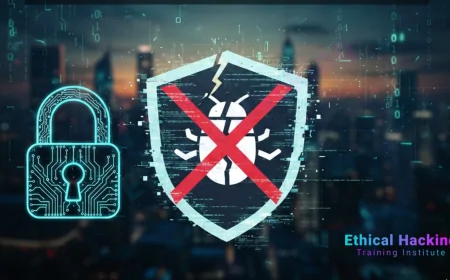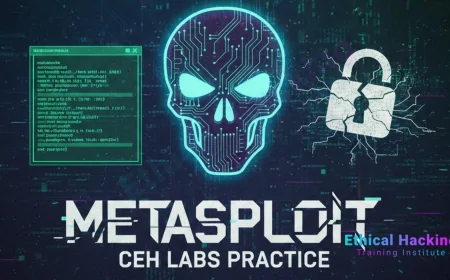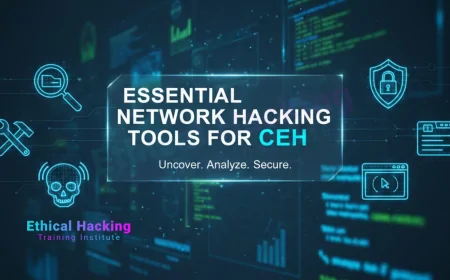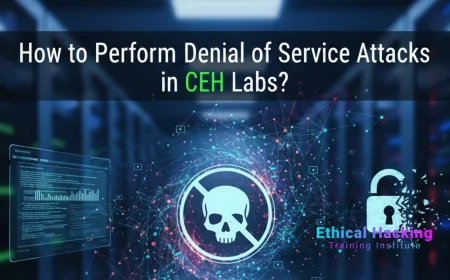Complete Hacking Course: Learn Ethical Hacking from Beginner to Advanced | Beginner to Advanced Ethical Hacking Course: Learn by Doing
Enroll in a complete hacking course to master ethical hacking from beginner to advanced. Learn cybersecurity skills, tools, certifications like CEH & OSCP, and prepare for real-world jobs in penetration testing and cyber defense.
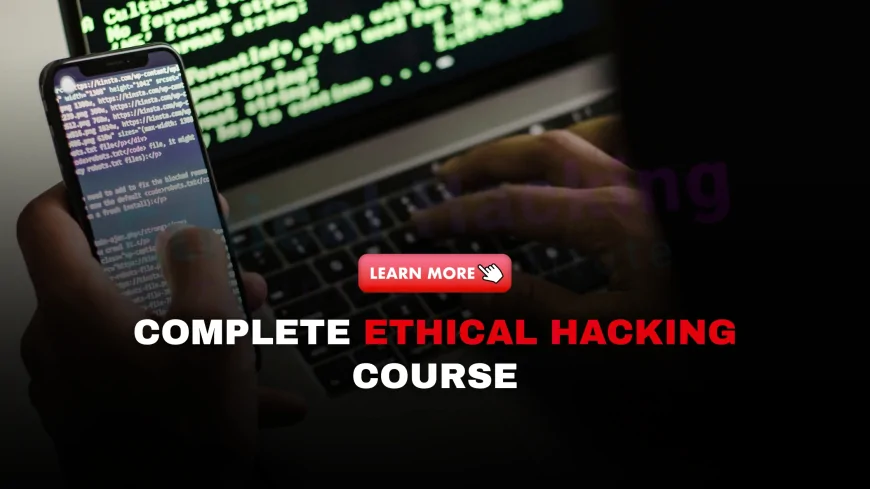
Table of Contents
- Introduction
- Why This Complete Hacking Course?
- Foundation – Beginner Level
- Intermediate Skills
- Advanced Techniques
- Essential Tools You'll Master
- Hands-On Projects & Labs
- Certifications to Pursue
- Suggested Learning Path & Timeline
- Career Tracks & Roles
- Freelancing & Bug Bounty
- Joining the Community
- Future-Proofing Your Skills
- Frequently Asked Questions
- Conclusion
Introduction
This course is designed to take you from zero knowledge to advanced ethical hacking skills. You’ll understand cyber threats, learn how to use industry tools, follow structured labs, earn certifications, and prepare for real-world roles.
Why This Complete Hacking Course?
The cybersecurity world is evolving rapidly, and ethical hackers are in high demand across industries. However, many learners struggle to find a clear, structured path that takes them from a beginner with zero experience to a confident, job-ready professional. That’s exactly what this Complete Hacking Course offers—a step-by-step, all-in-one guide designed for aspiring ethical hackers.
Unlike scattered tutorials or overly technical content, this course is curated to build your knowledge gradually. It starts with foundational IT and networking concepts, then moves into intermediate skills like vulnerability assessment, web app testing, and network exploitation. Finally, it dives deep into advanced topics such as reverse engineering, red teaming, and cloud security.
You’ll not only learn essential tools like Nmap, Burp Suite, and Metasploit, but also gain hands-on experience through structured labs and real-world simulations. The course also aligns with globally recognized certifications such as CEH, eJPT, and OSCP—giving your career a serious head start.
Whether you’re a student, IT professional, or career switcher, this course provides everything you need to launch and grow your ethical hacking career with confidence.
Foundation – Beginner Level
- Networking basics (TCP/IP, DNS, DHCP)
- Operating systems: Windows & Linux fundamentals
- Command-line essentials: Bash, PowerShell
- Basic programming: Python scripting
Intermediate Skills
- Footprinting & reconnaissance
- Port scanning & enumeration
- Vulnerability identification
- Web application hacking (SQLi, XSS, CSRF)
- Password attacks & cryptanalysis
Advanced Techniques
- Exploitation development
- Metasploit framework deep dive
- Reverse engineering & malware analysis
- Wireless & IoT hacking
- Cloud & container vulnerabilities
Essential Tools You'll Master
- Nmap, Masscan
- Wireshark, tcpdump
- Metasploit, Cobalt Strike
- Burp Suite, OWASP ZAP
- Hashcat, John the Ripper
- Immunity Debugger, Ghidra
Hands-On Projects & Labs
Plan to build labs using VirtualBox, AWS, or labs like TryHackMe, HTB; do full penetration tests on web apps, networks, IoT devices.
Certifications to Pursue
- CEH – foundational theory
- eJPT – entry-level pentesting
- OSCP – rigorous practical exam
- GPEN – GIAC penetration testing
Suggested Learning Path & Timeline
Start with IT basics and networking (1–2 months), move to intermediate hacking techniques and tools (3 months), then advance to exploit development and certifications like OSCP (3–4 months). Dedicate at least 7–10 hours per week for theory, labs, and CTFs to build strong, job-ready ethical hacking skills in under 9 months.
Career Tracks & Roles
- Penetration Tester
- Security Analyst
- Application Security Engineer
- Red Team Specialist
- Incident Response Professional
Freelancing & Bug Bounty
Freelancing and bug bounty hunting are powerful ways to earn income and gain recognition as an ethical hacker—especially if you prefer flexibility over a traditional job. Many cybersecurity professionals start freelancing part-time, then grow into full-time consultants or independent security researchers.
Bug bounty platforms like HackerOne, Bugcrowd, Intigriti, and Synack allow ethical hackers to legally find and report vulnerabilities in websites, applications, APIs, and networks. In return, you can earn rewards ranging from a few hundred to thousands of dollars per bug, depending on severity.
Freelance penetration testers can also offer services to startups, e-commerce platforms, and small businesses. Services may include web application security audits, vulnerability assessments, and social engineering simulations.
To succeed in this space:
-
Build a portfolio with lab work and real findings.
-
Publish responsible disclosure reports or blog write-ups.
-
Join private programs by maintaining good reputations on public bounty boards.
Bug bounty and freelancing require persistence, strong communication, and legal awareness—but they offer unmatched freedom, income potential, and practical skill development in real-world environments.
Joining the Community
Becoming part of the cybersecurity community accelerates your growth. Join platforms like Reddit’s r/netsecstudents, Discord servers, and local meetups. Participate in CTF competitions, attend conferences like DEF CON or Nullcon, and follow top ethical hackers on LinkedIn and Twitter to stay updated, get support, and network with industry professionals.
Future‑Proofing Your Skills
To stay relevant in the evolving cybersecurity landscape, expand your knowledge beyond traditional hacking. Learn about cloud security, DevSecOps, AI-driven threats, and IoT vulnerabilities. Master new tools, follow emerging attack vectors, and adapt to zero-trust models. Regularly update your skills through certifications, threat reports, and advanced labs. Ethical hackers who embrace change and continuous learning will remain in high demand across industries for years to come.
Frequently Asked Questions
1. How long does this complete hacking course take?
Typically 6–9 months with consistent weekly practice and labs.
2. Do I need coding skills?
Basic scripting (Python/Bash) is essential for automation and customization.
3. Is a degree required?
No—certifications and practical skills matter more than formal education.
4. What’s the difference between CEH and OSCP?
CEH is theory-based, OSCP is rigorous hands-on.
5. What real-world experience can I gain?
CTFs, bug bounties, internships, open-source projects, labs, and volunteering.
6. How much can I earn?
Entry roles ₹5–10 LPA; advanced pentesters ₹20–30 LPA+ in India.
7. Is freelancing viable?
Yes—with experience, you can freelance on pentest and bounty platforms.
8. How do I practice legally?
Use permissioned labs, CTF platforms, and responsible disclosure for real-world targets.
9. Networking or app security—which path?
Start generalist then specialize in web, network, cloud, IoT, or mobile security.
10. Should I learn Windows or Linux first?
Both—Linux is preferred for pentesting, Windows for enterprise context.
11. How often should I practice?
Minimum 5–7 hours/week, plus monthly deep lab work.
12. What tools are crucial?
Nmap, Burp, Metasploit, Wireshark, Hashcat form the core toolkit.
13. Do certifications expire?
CEH: 3 years (renew via credits), OSCP: no expiry but requires active practice.
14. How do I start bug bounty hunting?
Begin with private programs, low-hanging targets, and proper write-ups.
15. Can beginners start?
Yes—with structured learning, labs, and community help.
16. What are vulnerable lab platforms?
TryHackMe, HackTheBox, OWASP Juice Shop, Metasploitable.
17. What’s red team vs pentest?
Pentest: specific target tests. Red team: full-scope attack simulations over time.
18. Should I specialize?
Yes—web, network, mobile, cloud, IoT are popular specialization areas.
19. How do I track progress?
Use lab logs, certification goals, community recognition, and CTF rankings.
20. What’s the next step after OSCP?
Advanced certs: CRTP (AD hacking), CREST, CISSP, offensive courses like OSEP/UIAD.
Conclusion
This Complete Hacking Course provides a structured, detailed path from beginner to advanced ethical hacker. It balances theory, practical labs, certifications, career guidance, and lifelong learning—equipping you to succeed in cybersecurity. With dedication, consistent practice, and community engagement, you’ll be ready for any challenge ahead. Begin today, and transform into a skilled ethical hacker.
What's Your Reaction?
 Like
2
Like
2
 Dislike
0
Dislike
0
 Love
0
Love
0
 Funny
0
Funny
0
 Angry
1
Angry
1
 Sad
1
Sad
1
 Wow
0
Wow
0
